Taxation Law Assignment: Income Tax, Allowances, and Deductions
VerifiedAdded on 2023/01/10
|9
|1904
|80
Report
AI Summary
This report analyzes the taxation implications for Anna McCartney, a financial analyst, based on her employment arrangements and various financial transactions during the year ending June 30, 2018. The assignment examines assessable income, including sign-on bonuses, salary, bonuses, and allowances, referencing relevant sections of the ITAA 1997 and case law such as FCT v Pickford (1998) and Dean & Anor v FCT (1997). It explores the tax treatment of superannuation contributions, both employer-paid and salary-sacrificed, and work-related expenses such as travel and car allowances, linking these to relevant ATO rulings and legal precedents. The report also addresses the taxability of compensation payments received due to workplace injuries, distinguishing between capital and income receipts. The analysis provides a comprehensive overview of Anna's tax liabilities and entitlements, concluding with a summary of her total assessable income based on the provided financial data.
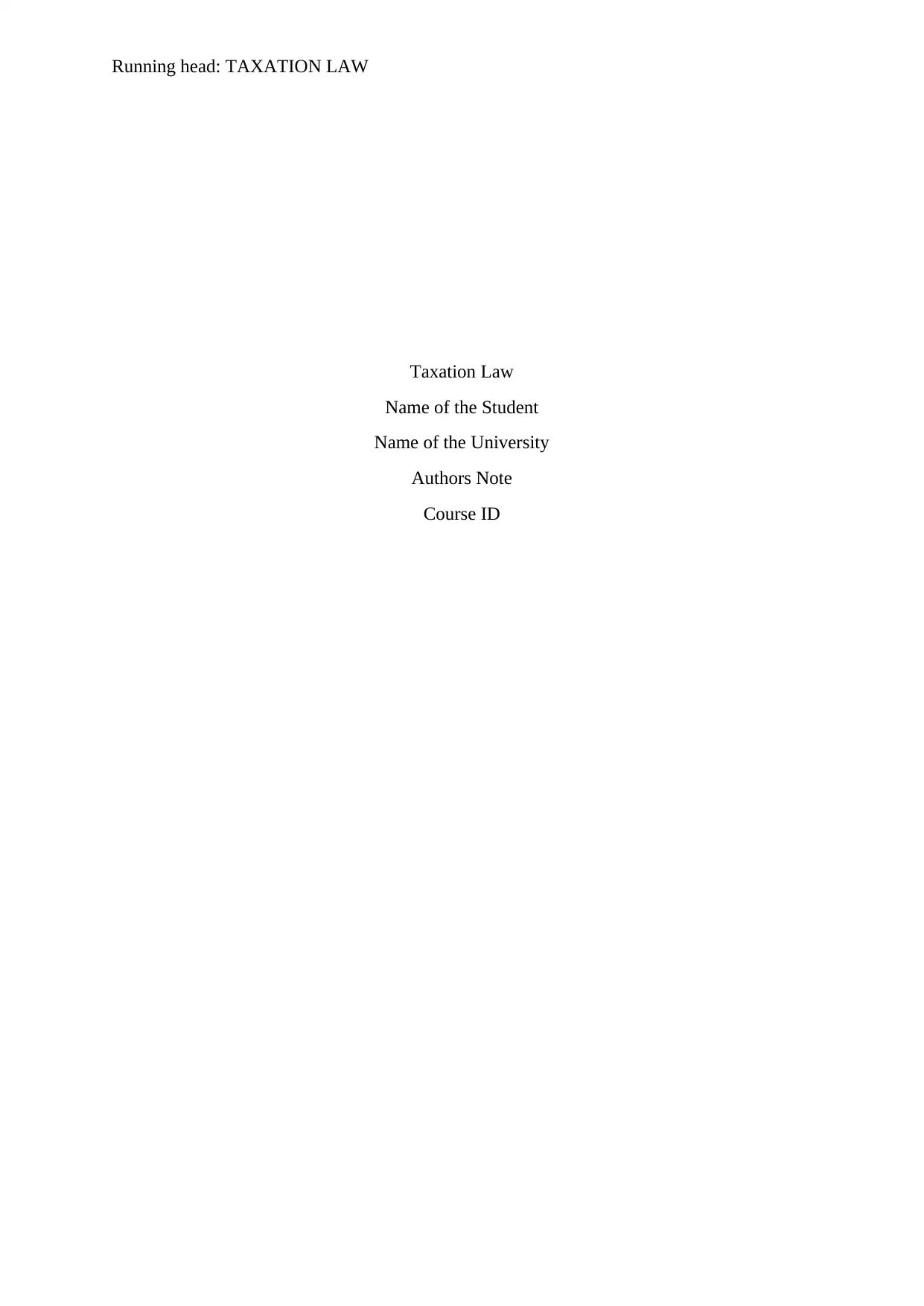
Running head: TAXATION LAW
Taxation Law
Name of the Student
Name of the University
Authors Note
Course ID
Taxation Law
Name of the Student
Name of the University
Authors Note
Course ID
Paraphrase This Document
Need a fresh take? Get an instant paraphrase of this document with our AI Paraphraser
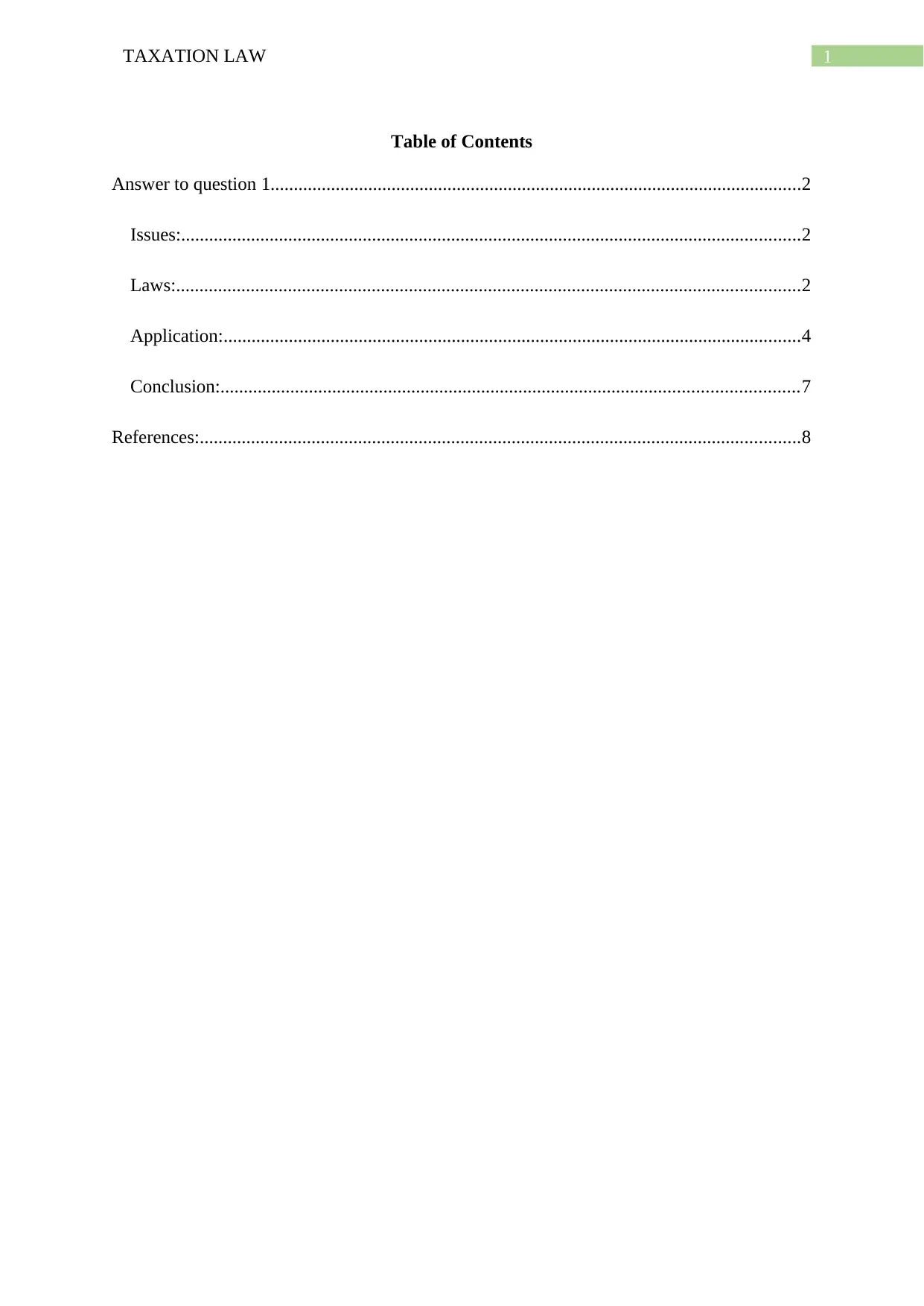
1TAXATION LAW
Table of Contents
Answer to question 1..................................................................................................................2
Issues:.....................................................................................................................................2
Laws:......................................................................................................................................2
Application:............................................................................................................................4
Conclusion:............................................................................................................................7
References:.................................................................................................................................8
Table of Contents
Answer to question 1..................................................................................................................2
Issues:.....................................................................................................................................2
Laws:......................................................................................................................................2
Application:............................................................................................................................4
Conclusion:............................................................................................................................7
References:.................................................................................................................................8
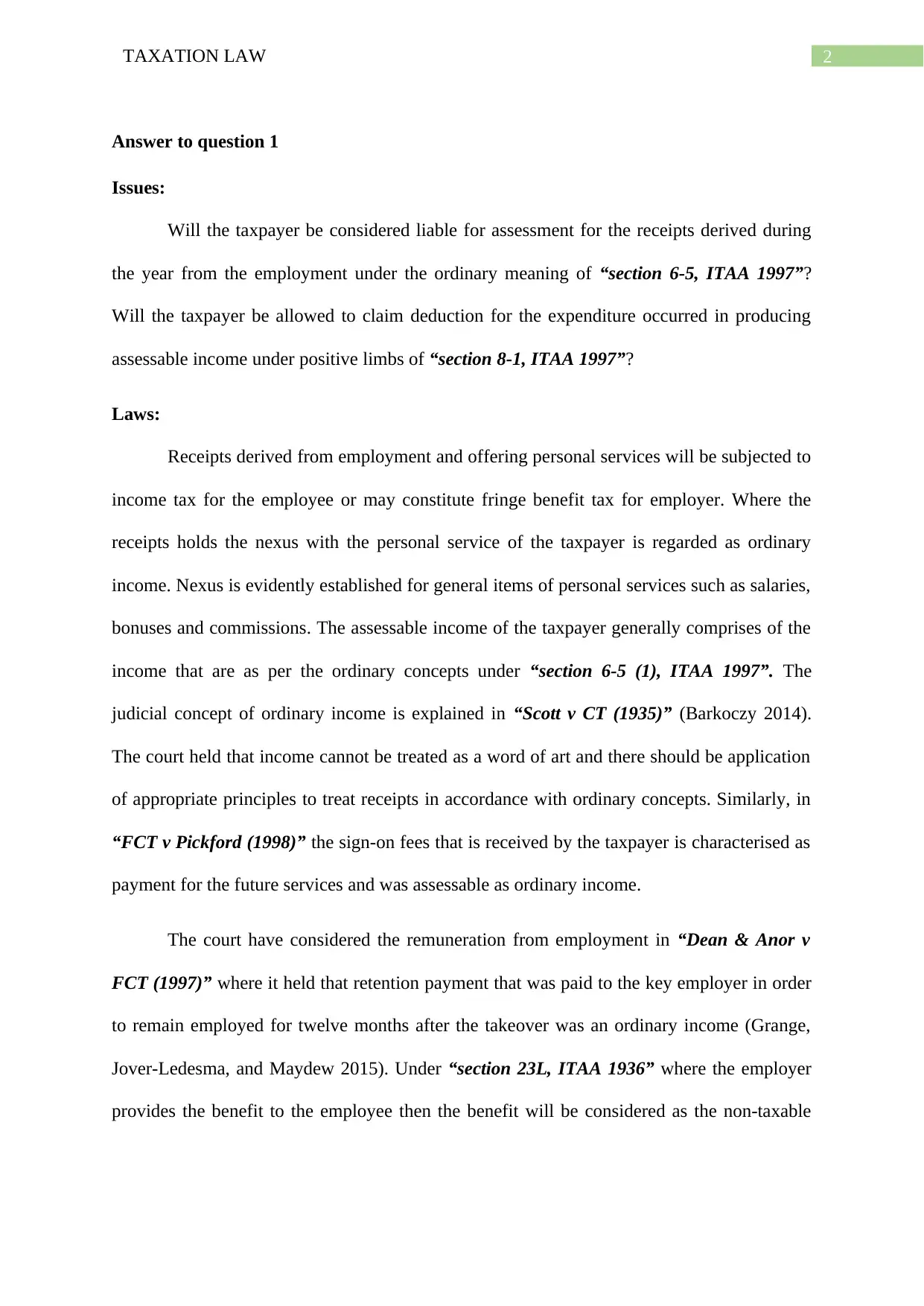
2TAXATION LAW
Answer to question 1
Issues:
Will the taxpayer be considered liable for assessment for the receipts derived during
the year from the employment under the ordinary meaning of “section 6-5, ITAA 1997”?
Will the taxpayer be allowed to claim deduction for the expenditure occurred in producing
assessable income under positive limbs of “section 8-1, ITAA 1997”?
Laws:
Receipts derived from employment and offering personal services will be subjected to
income tax for the employee or may constitute fringe benefit tax for employer. Where the
receipts holds the nexus with the personal service of the taxpayer is regarded as ordinary
income. Nexus is evidently established for general items of personal services such as salaries,
bonuses and commissions. The assessable income of the taxpayer generally comprises of the
income that are as per the ordinary concepts under “section 6-5 (1), ITAA 1997”. The
judicial concept of ordinary income is explained in “Scott v CT (1935)” (Barkoczy 2014).
The court held that income cannot be treated as a word of art and there should be application
of appropriate principles to treat receipts in accordance with ordinary concepts. Similarly, in
“FCT v Pickford (1998)” the sign-on fees that is received by the taxpayer is characterised as
payment for the future services and was assessable as ordinary income.
The court have considered the remuneration from employment in “Dean & Anor v
FCT (1997)” where it held that retention payment that was paid to the key employer in order
to remain employed for twelve months after the takeover was an ordinary income (Grange,
Jover-Ledesma, and Maydew 2015). Under “section 23L, ITAA 1936” where the employer
provides the benefit to the employee then the benefit will be considered as the non-taxable
Answer to question 1
Issues:
Will the taxpayer be considered liable for assessment for the receipts derived during
the year from the employment under the ordinary meaning of “section 6-5, ITAA 1997”?
Will the taxpayer be allowed to claim deduction for the expenditure occurred in producing
assessable income under positive limbs of “section 8-1, ITAA 1997”?
Laws:
Receipts derived from employment and offering personal services will be subjected to
income tax for the employee or may constitute fringe benefit tax for employer. Where the
receipts holds the nexus with the personal service of the taxpayer is regarded as ordinary
income. Nexus is evidently established for general items of personal services such as salaries,
bonuses and commissions. The assessable income of the taxpayer generally comprises of the
income that are as per the ordinary concepts under “section 6-5 (1), ITAA 1997”. The
judicial concept of ordinary income is explained in “Scott v CT (1935)” (Barkoczy 2014).
The court held that income cannot be treated as a word of art and there should be application
of appropriate principles to treat receipts in accordance with ordinary concepts. Similarly, in
“FCT v Pickford (1998)” the sign-on fees that is received by the taxpayer is characterised as
payment for the future services and was assessable as ordinary income.
The court have considered the remuneration from employment in “Dean & Anor v
FCT (1997)” where it held that retention payment that was paid to the key employer in order
to remain employed for twelve months after the takeover was an ordinary income (Grange,
Jover-Ledesma, and Maydew 2015). Under “section 23L, ITAA 1936” where the employer
provides the benefit to the employee then the benefit will be considered as the non-taxable
⊘ This is a preview!⊘
Do you want full access?
Subscribe today to unlock all pages.

Trusted by 1+ million students worldwide
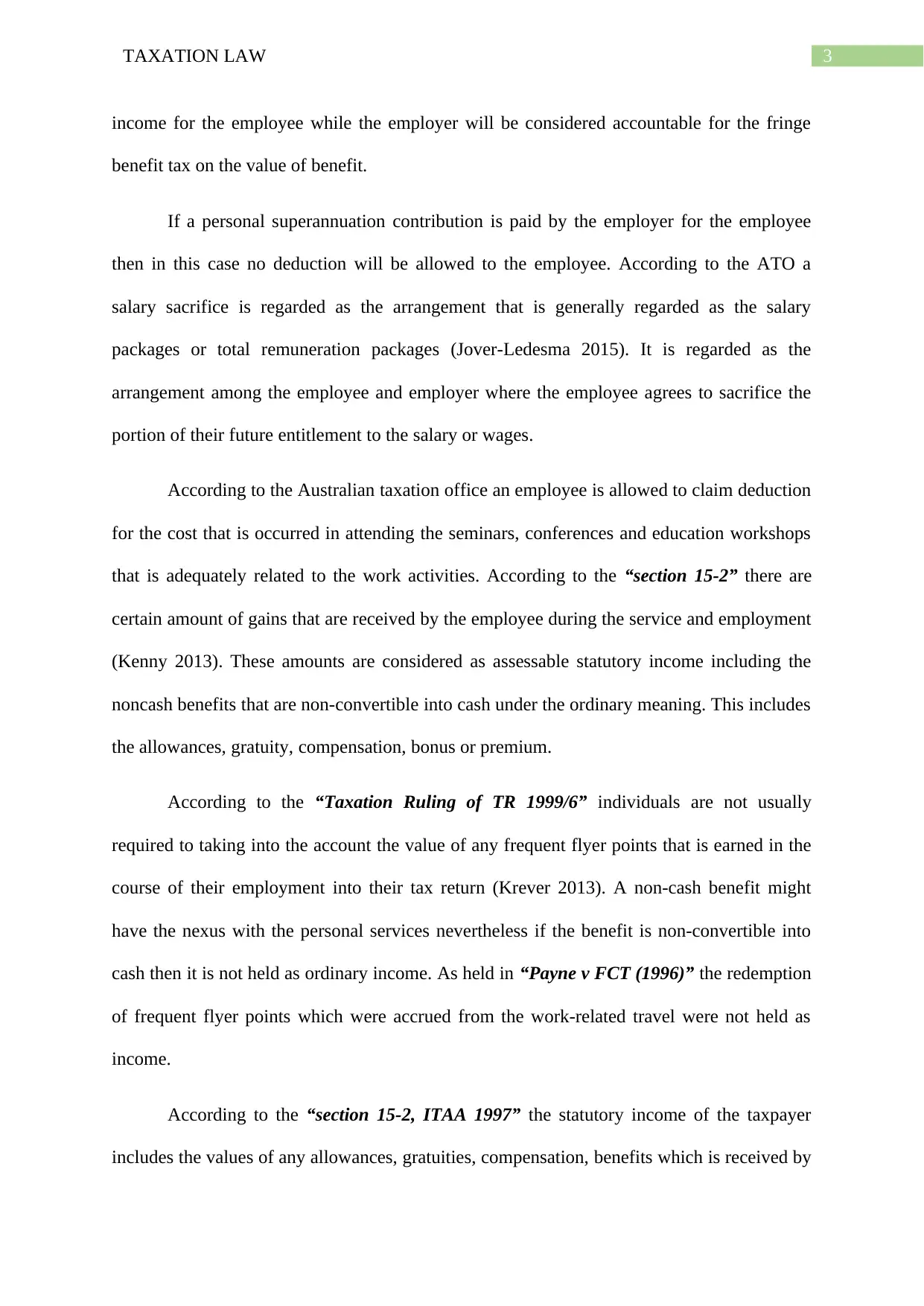
3TAXATION LAW
income for the employee while the employer will be considered accountable for the fringe
benefit tax on the value of benefit.
If a personal superannuation contribution is paid by the employer for the employee
then in this case no deduction will be allowed to the employee. According to the ATO a
salary sacrifice is regarded as the arrangement that is generally regarded as the salary
packages or total remuneration packages (Jover-Ledesma 2015). It is regarded as the
arrangement among the employee and employer where the employee agrees to sacrifice the
portion of their future entitlement to the salary or wages.
According to the Australian taxation office an employee is allowed to claim deduction
for the cost that is occurred in attending the seminars, conferences and education workshops
that is adequately related to the work activities. According to the “section 15-2” there are
certain amount of gains that are received by the employee during the service and employment
(Kenny 2013). These amounts are considered as assessable statutory income including the
noncash benefits that are non-convertible into cash under the ordinary meaning. This includes
the allowances, gratuity, compensation, bonus or premium.
According to the “Taxation Ruling of TR 1999/6” individuals are not usually
required to taking into the account the value of any frequent flyer points that is earned in the
course of their employment into their tax return (Krever 2013). A non-cash benefit might
have the nexus with the personal services nevertheless if the benefit is non-convertible into
cash then it is not held as ordinary income. As held in “Payne v FCT (1996)” the redemption
of frequent flyer points which were accrued from the work-related travel were not held as
income.
According to the “section 15-2, ITAA 1997” the statutory income of the taxpayer
includes the values of any allowances, gratuities, compensation, benefits which is received by
income for the employee while the employer will be considered accountable for the fringe
benefit tax on the value of benefit.
If a personal superannuation contribution is paid by the employer for the employee
then in this case no deduction will be allowed to the employee. According to the ATO a
salary sacrifice is regarded as the arrangement that is generally regarded as the salary
packages or total remuneration packages (Jover-Ledesma 2015). It is regarded as the
arrangement among the employee and employer where the employee agrees to sacrifice the
portion of their future entitlement to the salary or wages.
According to the Australian taxation office an employee is allowed to claim deduction
for the cost that is occurred in attending the seminars, conferences and education workshops
that is adequately related to the work activities. According to the “section 15-2” there are
certain amount of gains that are received by the employee during the service and employment
(Kenny 2013). These amounts are considered as assessable statutory income including the
noncash benefits that are non-convertible into cash under the ordinary meaning. This includes
the allowances, gratuity, compensation, bonus or premium.
According to the “Taxation Ruling of TR 1999/6” individuals are not usually
required to taking into the account the value of any frequent flyer points that is earned in the
course of their employment into their tax return (Krever 2013). A non-cash benefit might
have the nexus with the personal services nevertheless if the benefit is non-convertible into
cash then it is not held as ordinary income. As held in “Payne v FCT (1996)” the redemption
of frequent flyer points which were accrued from the work-related travel were not held as
income.
According to the “section 15-2, ITAA 1997” the statutory income of the taxpayer
includes the values of any allowances, gratuities, compensation, benefits which is received by
Paraphrase This Document
Need a fresh take? Get an instant paraphrase of this document with our AI Paraphraser
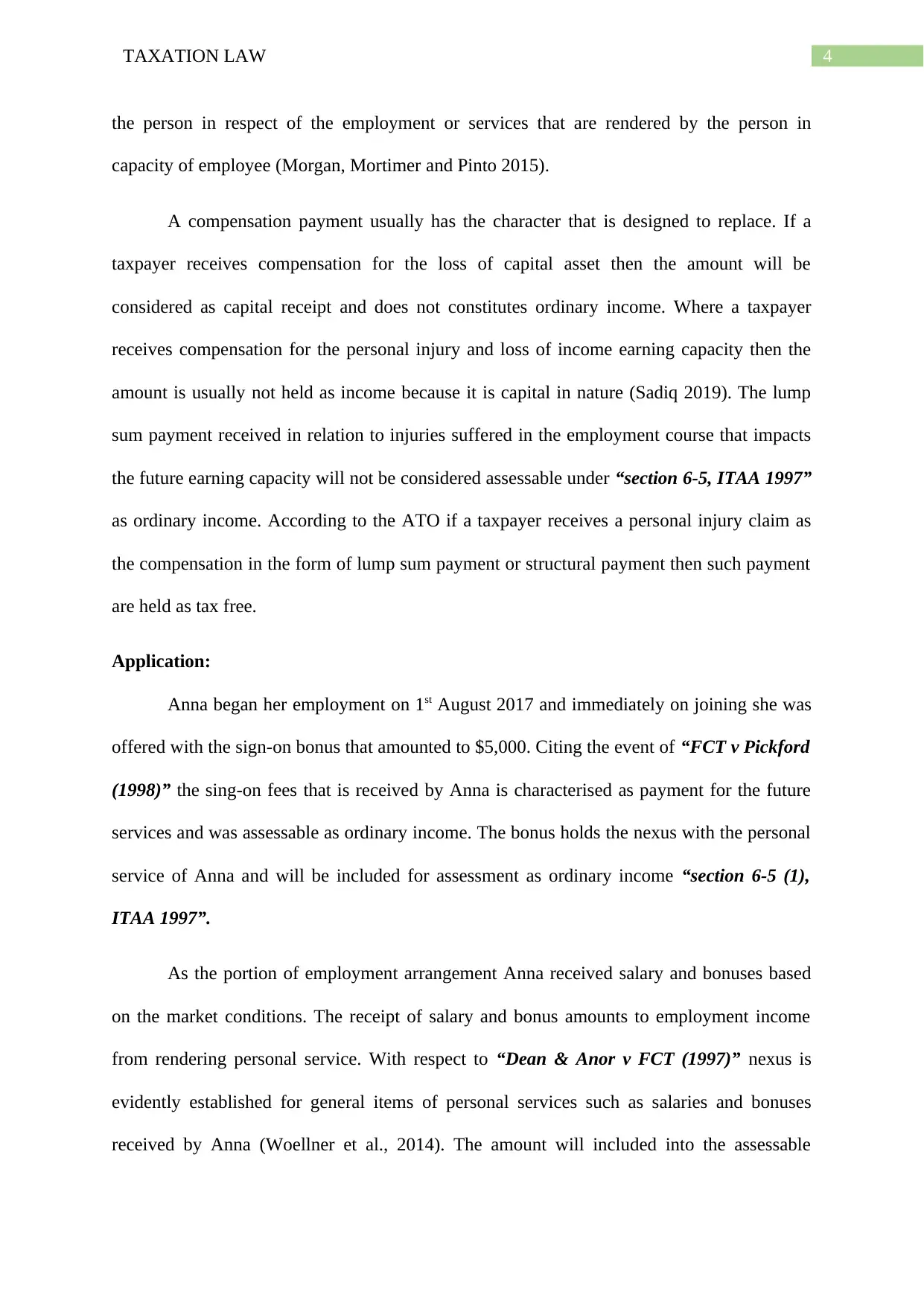
4TAXATION LAW
the person in respect of the employment or services that are rendered by the person in
capacity of employee (Morgan, Mortimer and Pinto 2015).
A compensation payment usually has the character that is designed to replace. If a
taxpayer receives compensation for the loss of capital asset then the amount will be
considered as capital receipt and does not constitutes ordinary income. Where a taxpayer
receives compensation for the personal injury and loss of income earning capacity then the
amount is usually not held as income because it is capital in nature (Sadiq 2019). The lump
sum payment received in relation to injuries suffered in the employment course that impacts
the future earning capacity will not be considered assessable under “section 6-5, ITAA 1997”
as ordinary income. According to the ATO if a taxpayer receives a personal injury claim as
the compensation in the form of lump sum payment or structural payment then such payment
are held as tax free.
Application:
Anna began her employment on 1st August 2017 and immediately on joining she was
offered with the sign-on bonus that amounted to $5,000. Citing the event of “FCT v Pickford
(1998)” the sing-on fees that is received by Anna is characterised as payment for the future
services and was assessable as ordinary income. The bonus holds the nexus with the personal
service of Anna and will be included for assessment as ordinary income “section 6-5 (1),
ITAA 1997”.
As the portion of employment arrangement Anna received salary and bonuses based
on the market conditions. The receipt of salary and bonus amounts to employment income
from rendering personal service. With respect to “Dean & Anor v FCT (1997)” nexus is
evidently established for general items of personal services such as salaries and bonuses
received by Anna (Woellner et al., 2014). The amount will included into the assessable
the person in respect of the employment or services that are rendered by the person in
capacity of employee (Morgan, Mortimer and Pinto 2015).
A compensation payment usually has the character that is designed to replace. If a
taxpayer receives compensation for the loss of capital asset then the amount will be
considered as capital receipt and does not constitutes ordinary income. Where a taxpayer
receives compensation for the personal injury and loss of income earning capacity then the
amount is usually not held as income because it is capital in nature (Sadiq 2019). The lump
sum payment received in relation to injuries suffered in the employment course that impacts
the future earning capacity will not be considered assessable under “section 6-5, ITAA 1997”
as ordinary income. According to the ATO if a taxpayer receives a personal injury claim as
the compensation in the form of lump sum payment or structural payment then such payment
are held as tax free.
Application:
Anna began her employment on 1st August 2017 and immediately on joining she was
offered with the sign-on bonus that amounted to $5,000. Citing the event of “FCT v Pickford
(1998)” the sing-on fees that is received by Anna is characterised as payment for the future
services and was assessable as ordinary income. The bonus holds the nexus with the personal
service of Anna and will be included for assessment as ordinary income “section 6-5 (1),
ITAA 1997”.
As the portion of employment arrangement Anna received salary and bonuses based
on the market conditions. The receipt of salary and bonus amounts to employment income
from rendering personal service. With respect to “Dean & Anor v FCT (1997)” nexus is
evidently established for general items of personal services such as salaries and bonuses
received by Anna (Woellner et al., 2014). The amount will included into the assessable
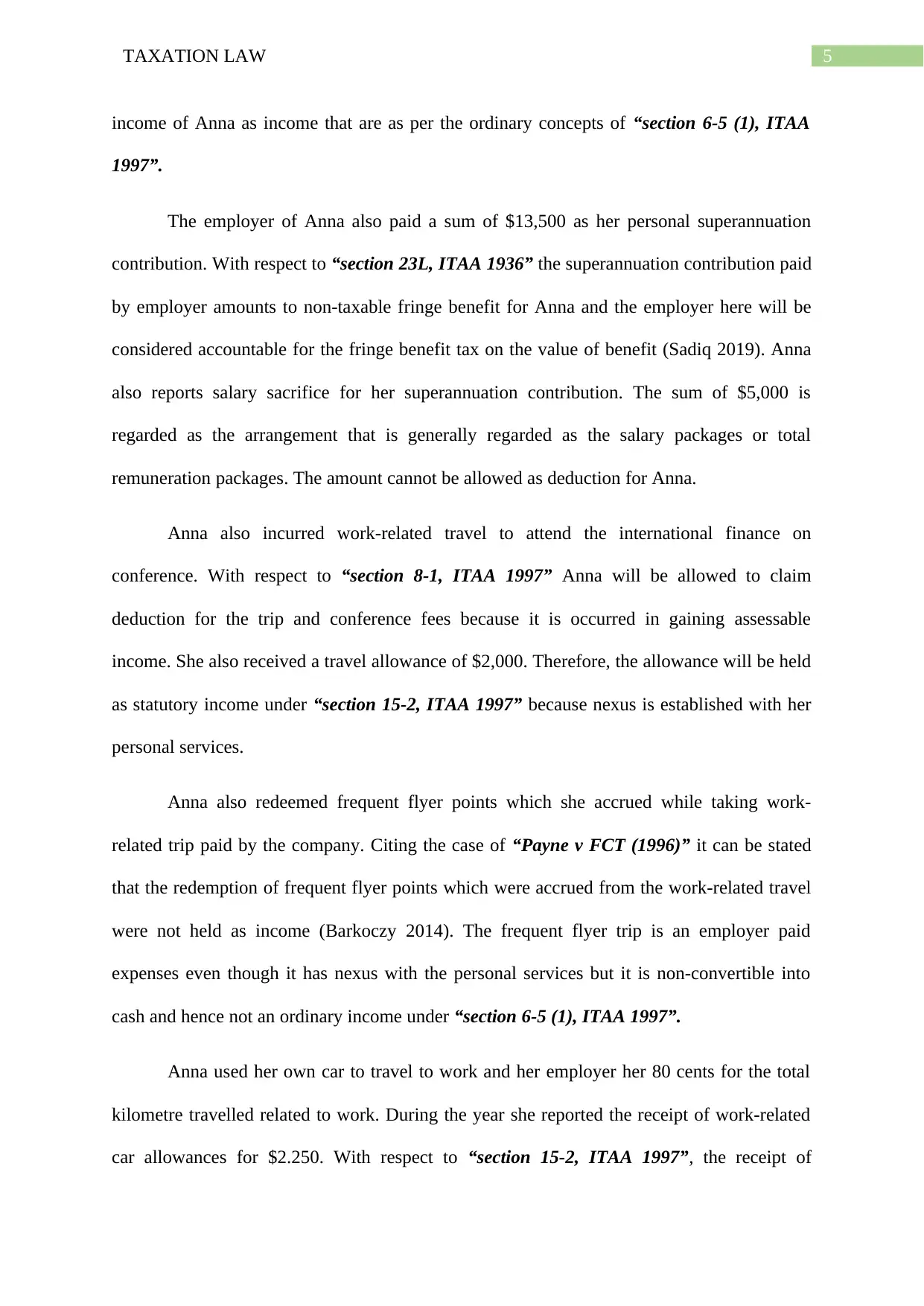
5TAXATION LAW
income of Anna as income that are as per the ordinary concepts of “section 6-5 (1), ITAA
1997”.
The employer of Anna also paid a sum of $13,500 as her personal superannuation
contribution. With respect to “section 23L, ITAA 1936” the superannuation contribution paid
by employer amounts to non-taxable fringe benefit for Anna and the employer here will be
considered accountable for the fringe benefit tax on the value of benefit (Sadiq 2019). Anna
also reports salary sacrifice for her superannuation contribution. The sum of $5,000 is
regarded as the arrangement that is generally regarded as the salary packages or total
remuneration packages. The amount cannot be allowed as deduction for Anna.
Anna also incurred work-related travel to attend the international finance on
conference. With respect to “section 8-1, ITAA 1997” Anna will be allowed to claim
deduction for the trip and conference fees because it is occurred in gaining assessable
income. She also received a travel allowance of $2,000. Therefore, the allowance will be held
as statutory income under “section 15-2, ITAA 1997” because nexus is established with her
personal services.
Anna also redeemed frequent flyer points which she accrued while taking work-
related trip paid by the company. Citing the case of “Payne v FCT (1996)” it can be stated
that the redemption of frequent flyer points which were accrued from the work-related travel
were not held as income (Barkoczy 2014). The frequent flyer trip is an employer paid
expenses even though it has nexus with the personal services but it is non-convertible into
cash and hence not an ordinary income under “section 6-5 (1), ITAA 1997”.
Anna used her own car to travel to work and her employer her 80 cents for the total
kilometre travelled related to work. During the year she reported the receipt of work-related
car allowances for $2.250. With respect to “section 15-2, ITAA 1997”, the receipt of
income of Anna as income that are as per the ordinary concepts of “section 6-5 (1), ITAA
1997”.
The employer of Anna also paid a sum of $13,500 as her personal superannuation
contribution. With respect to “section 23L, ITAA 1936” the superannuation contribution paid
by employer amounts to non-taxable fringe benefit for Anna and the employer here will be
considered accountable for the fringe benefit tax on the value of benefit (Sadiq 2019). Anna
also reports salary sacrifice for her superannuation contribution. The sum of $5,000 is
regarded as the arrangement that is generally regarded as the salary packages or total
remuneration packages. The amount cannot be allowed as deduction for Anna.
Anna also incurred work-related travel to attend the international finance on
conference. With respect to “section 8-1, ITAA 1997” Anna will be allowed to claim
deduction for the trip and conference fees because it is occurred in gaining assessable
income. She also received a travel allowance of $2,000. Therefore, the allowance will be held
as statutory income under “section 15-2, ITAA 1997” because nexus is established with her
personal services.
Anna also redeemed frequent flyer points which she accrued while taking work-
related trip paid by the company. Citing the case of “Payne v FCT (1996)” it can be stated
that the redemption of frequent flyer points which were accrued from the work-related travel
were not held as income (Barkoczy 2014). The frequent flyer trip is an employer paid
expenses even though it has nexus with the personal services but it is non-convertible into
cash and hence not an ordinary income under “section 6-5 (1), ITAA 1997”.
Anna used her own car to travel to work and her employer her 80 cents for the total
kilometre travelled related to work. During the year she reported the receipt of work-related
car allowances for $2.250. With respect to “section 15-2, ITAA 1997”, the receipt of
⊘ This is a preview!⊘
Do you want full access?
Subscribe today to unlock all pages.

Trusted by 1+ million students worldwide
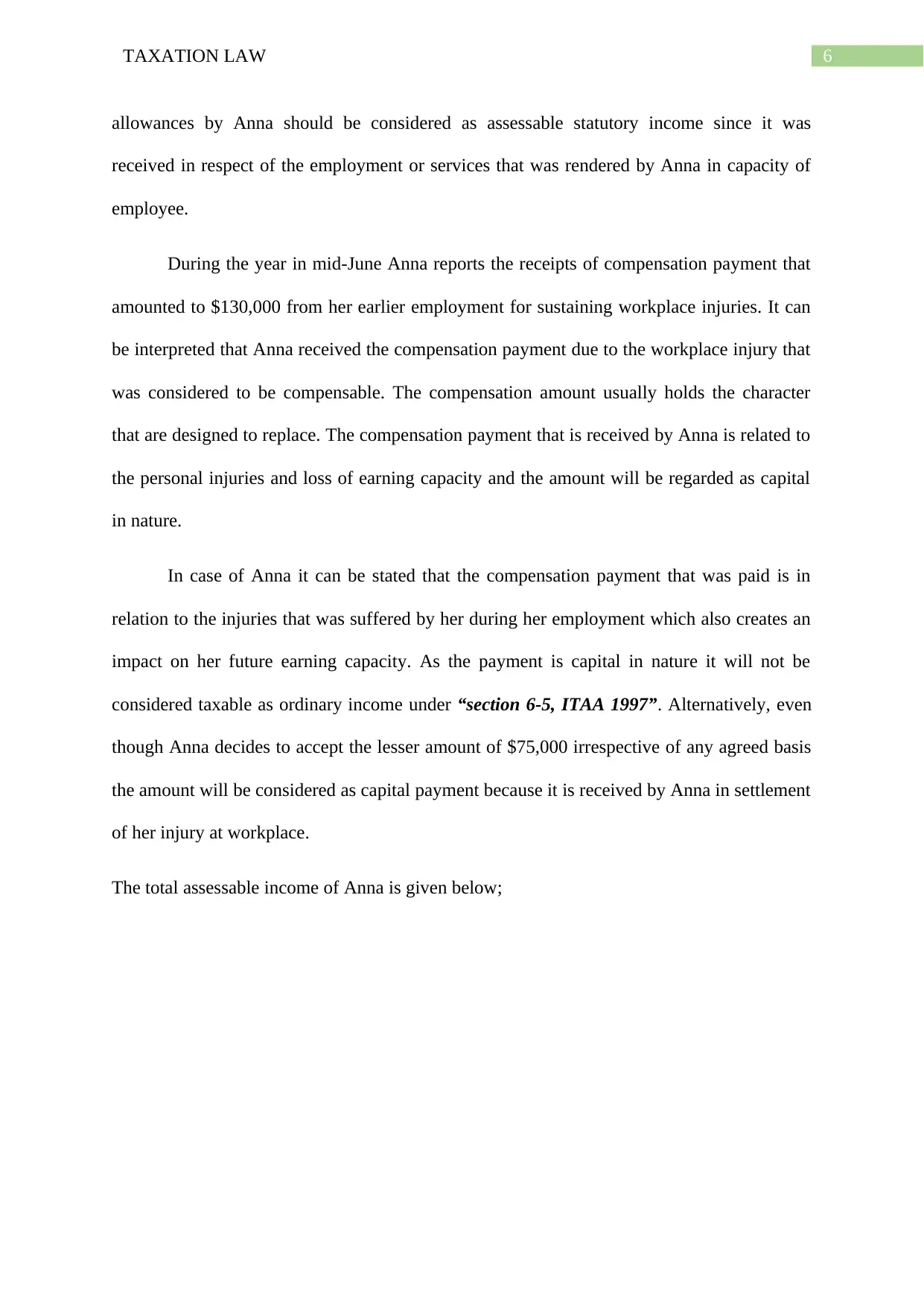
6TAXATION LAW
allowances by Anna should be considered as assessable statutory income since it was
received in respect of the employment or services that was rendered by Anna in capacity of
employee.
During the year in mid-June Anna reports the receipts of compensation payment that
amounted to $130,000 from her earlier employment for sustaining workplace injuries. It can
be interpreted that Anna received the compensation payment due to the workplace injury that
was considered to be compensable. The compensation amount usually holds the character
that are designed to replace. The compensation payment that is received by Anna is related to
the personal injuries and loss of earning capacity and the amount will be regarded as capital
in nature.
In case of Anna it can be stated that the compensation payment that was paid is in
relation to the injuries that was suffered by her during her employment which also creates an
impact on her future earning capacity. As the payment is capital in nature it will not be
considered taxable as ordinary income under “section 6-5, ITAA 1997”. Alternatively, even
though Anna decides to accept the lesser amount of $75,000 irrespective of any agreed basis
the amount will be considered as capital payment because it is received by Anna in settlement
of her injury at workplace.
The total assessable income of Anna is given below;
allowances by Anna should be considered as assessable statutory income since it was
received in respect of the employment or services that was rendered by Anna in capacity of
employee.
During the year in mid-June Anna reports the receipts of compensation payment that
amounted to $130,000 from her earlier employment for sustaining workplace injuries. It can
be interpreted that Anna received the compensation payment due to the workplace injury that
was considered to be compensable. The compensation amount usually holds the character
that are designed to replace. The compensation payment that is received by Anna is related to
the personal injuries and loss of earning capacity and the amount will be regarded as capital
in nature.
In case of Anna it can be stated that the compensation payment that was paid is in
relation to the injuries that was suffered by her during her employment which also creates an
impact on her future earning capacity. As the payment is capital in nature it will not be
considered taxable as ordinary income under “section 6-5, ITAA 1997”. Alternatively, even
though Anna decides to accept the lesser amount of $75,000 irrespective of any agreed basis
the amount will be considered as capital payment because it is received by Anna in settlement
of her injury at workplace.
The total assessable income of Anna is given below;
Paraphrase This Document
Need a fresh take? Get an instant paraphrase of this document with our AI Paraphraser
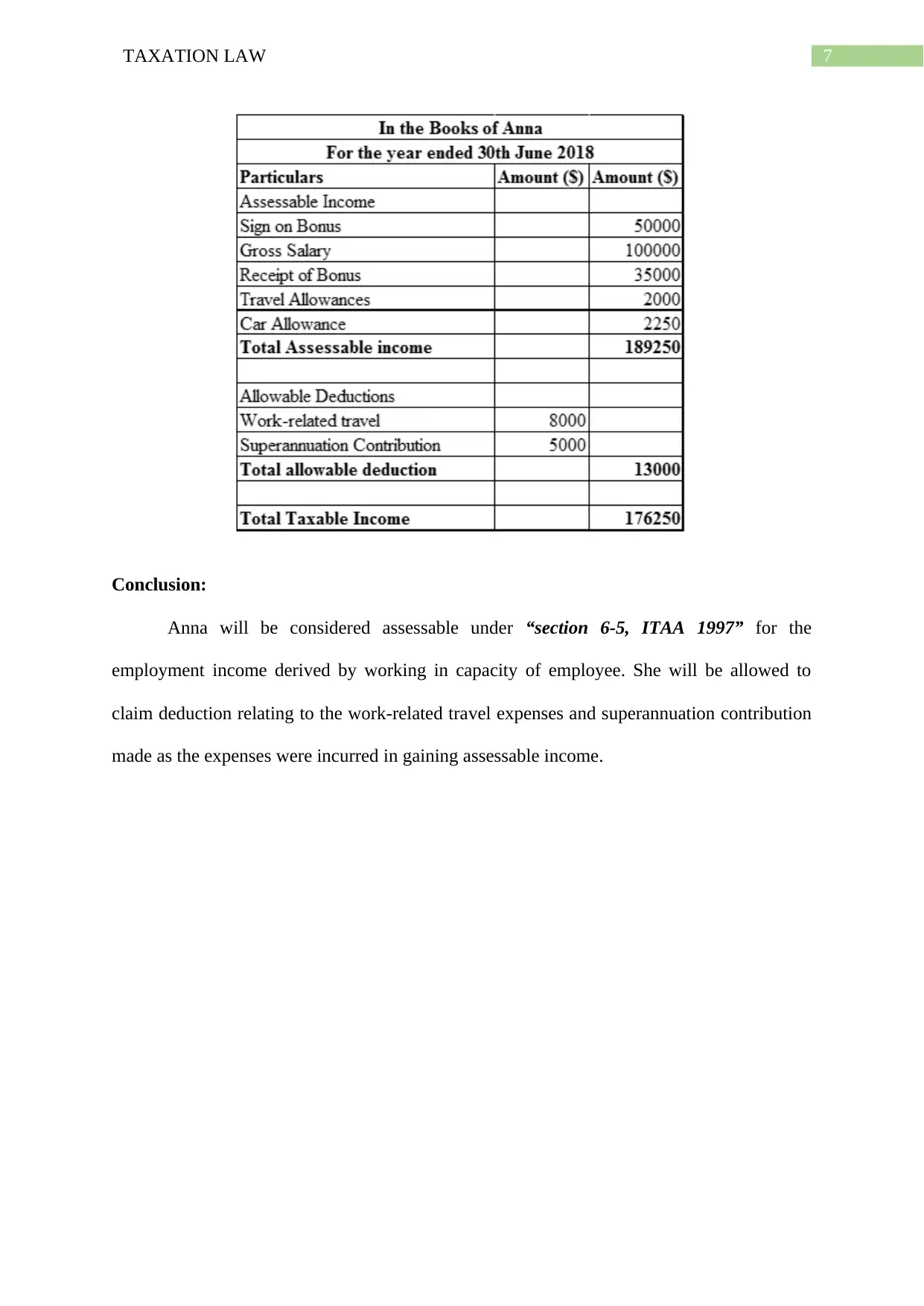
7TAXATION LAW
Conclusion:
Anna will be considered assessable under “section 6-5, ITAA 1997” for the
employment income derived by working in capacity of employee. She will be allowed to
claim deduction relating to the work-related travel expenses and superannuation contribution
made as the expenses were incurred in gaining assessable income.
Conclusion:
Anna will be considered assessable under “section 6-5, ITAA 1997” for the
employment income derived by working in capacity of employee. She will be allowed to
claim deduction relating to the work-related travel expenses and superannuation contribution
made as the expenses were incurred in gaining assessable income.
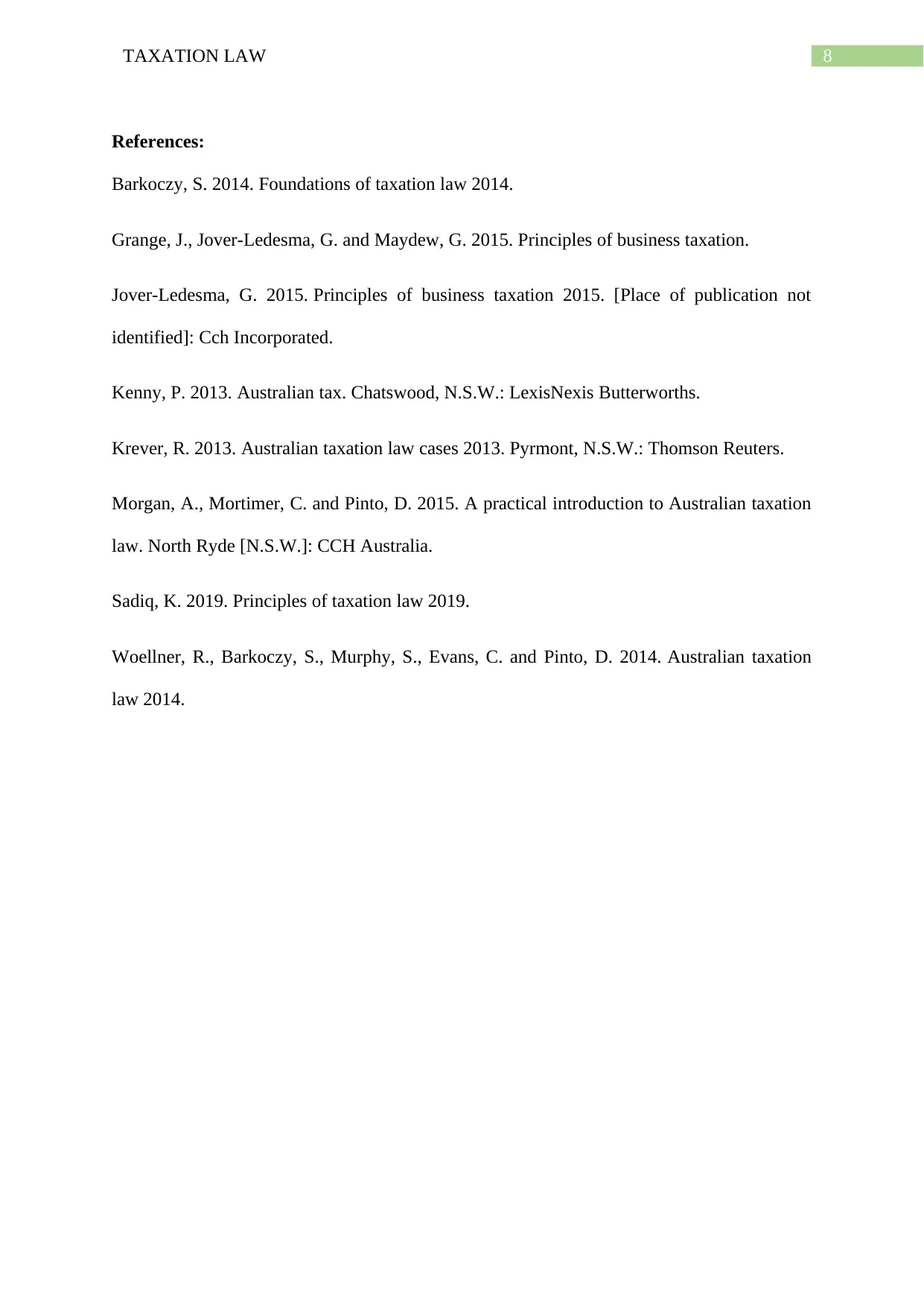
8TAXATION LAW
References:
Barkoczy, S. 2014. Foundations of taxation law 2014.
Grange, J., Jover-Ledesma, G. and Maydew, G. 2015. Principles of business taxation.
Jover-Ledesma, G. 2015. Principles of business taxation 2015. [Place of publication not
identified]: Cch Incorporated.
Kenny, P. 2013. Australian tax. Chatswood, N.S.W.: LexisNexis Butterworths.
Krever, R. 2013. Australian taxation law cases 2013. Pyrmont, N.S.W.: Thomson Reuters.
Morgan, A., Mortimer, C. and Pinto, D. 2015. A practical introduction to Australian taxation
law. North Ryde [N.S.W.]: CCH Australia.
Sadiq, K. 2019. Principles of taxation law 2019.
Woellner, R., Barkoczy, S., Murphy, S., Evans, C. and Pinto, D. 2014. Australian taxation
law 2014.
References:
Barkoczy, S. 2014. Foundations of taxation law 2014.
Grange, J., Jover-Ledesma, G. and Maydew, G. 2015. Principles of business taxation.
Jover-Ledesma, G. 2015. Principles of business taxation 2015. [Place of publication not
identified]: Cch Incorporated.
Kenny, P. 2013. Australian tax. Chatswood, N.S.W.: LexisNexis Butterworths.
Krever, R. 2013. Australian taxation law cases 2013. Pyrmont, N.S.W.: Thomson Reuters.
Morgan, A., Mortimer, C. and Pinto, D. 2015. A practical introduction to Australian taxation
law. North Ryde [N.S.W.]: CCH Australia.
Sadiq, K. 2019. Principles of taxation law 2019.
Woellner, R., Barkoczy, S., Murphy, S., Evans, C. and Pinto, D. 2014. Australian taxation
law 2014.
⊘ This is a preview!⊘
Do you want full access?
Subscribe today to unlock all pages.

Trusted by 1+ million students worldwide
1 out of 9
Related Documents
Your All-in-One AI-Powered Toolkit for Academic Success.
+13062052269
info@desklib.com
Available 24*7 on WhatsApp / Email
![[object Object]](/_next/static/media/star-bottom.7253800d.svg)
Unlock your academic potential
Copyright © 2020–2026 A2Z Services. All Rights Reserved. Developed and managed by ZUCOL.




